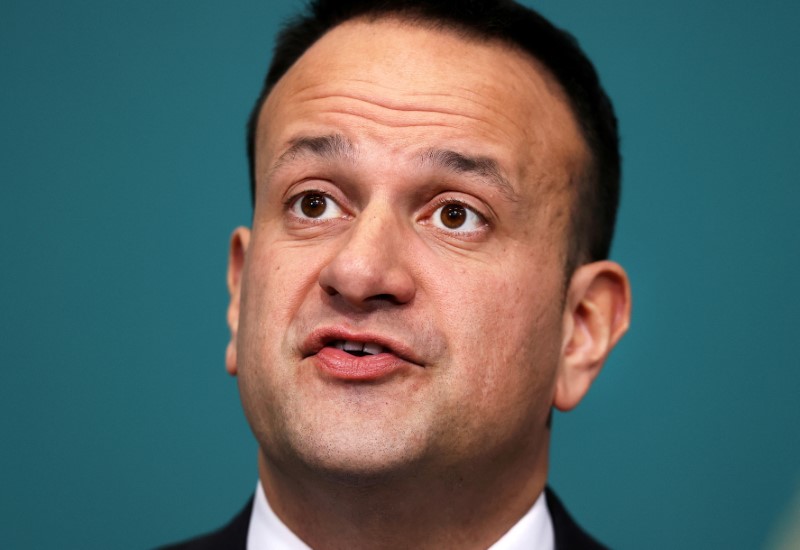By Padraic Halpin and Conor Humphries
DUBLIN (Reuters) - Ireland's prime minister ordered citizens to stay home until April 12 to help slow the spread of coronavirus, telling them they can only leave to shop for groceries, for brief individual physical exercise or to make family visits that are essential.
Almost all shops will be shut, all public gatherings outside of household units prohibited completely, and those over the age of 70 or with chronic diseases will be told to stay in their homes completely.
These "radical actions" were aimed at saving as many lives as possible, Prime Minister Leo Varadkar said.
Varadkar had earlier warned that Ireland's intensive care units would be at capacity within a few days given the rate of spread of coronavirus. Confirmed cases of coronavirus in Ireland rose to 2,121 on Friday from 1,819 a day ago, with 22 deaths.
I'm appealing to every man, woman and child to make these sacrifices for the love of each other. To begin each day knowing that ever single inconvenience will save lives. Show that you care for your family and friends: Stay home," Varadkar told a news conference.
"There isn't much more beyond this I think that we could do in terms of further restrictive measures."
Ireland had previously closed schools, universities, pubs and most non-essential retail in a gradual ramping up of restrictions over the last two weeks.
Other fresh measures include restricting public transport to essential workers, with travel for all severely restricted beyond two kilometers from the radius of their own home.
Despite the announcement that the restrictions will be introduced from midnight, the list of workers and premises deemed as essential will not be published until Saturday, a government spokesman said.
"GO FURTHER"
Ireland's chief medical officer, Tony Holohan, said the initial measures were working with the increase in the total number of cases slowing down compared to what they might have expected but that "does not tell us that the worst is over."
Holohan had expressed particular concern on the number of intensive care admission - 59 at the last count on Wednesday, representing over 10% Ireland's capacity - and that community transmission accounted for 52% of all cases.
"We think we see signs that are encouraging us, that this is helping. But we think we need to go further," he said.
"We think in the early course of this infection, with the support that we have had from the public, that with these additional strengthening measures, we can drive the infection back out of the community and more into households."
Ireland significantly increased income support for those who had already lost their jobs or were at risk of joining them this week. A government official reported "unprecedented demand" for the payments earlier on Friday.
The applications for the special pandemic unemployment benefit and regular jobseekers payment equated to 10 months worth of normal claim load in just 10 days, Elizabeth Canavan, an assistant secretary at Varadkar's department, said.
In a bid to slow an unemployment surge a state-funded think tank warned could hit 18% by summer from 4.8% last month, the government will pay 70% of workers' wages for struggling firms and is urging many to re-employ staff already cut.

Some 11,200 firms applied for the assistance by 1300 GMT, just hours after the opening of he scheme, the head of Ireland's tax authority, Niall Cody, told national broadcaster RTE.